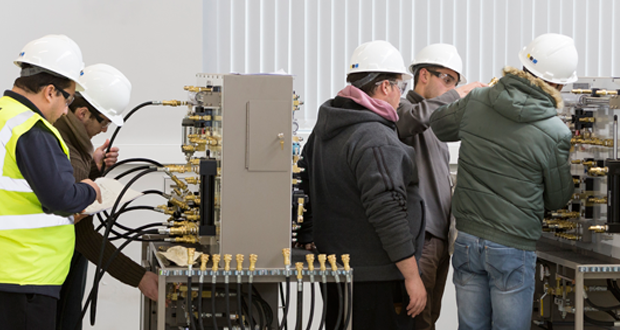WADI advances in Brazil, Malta

IADC holds workforce development workshop with Brazilian group; students graduate from WADI pilot program in Malta
By Amy Rose, Director-External Relations, IADC
What began as a small collaboration in 2013 between IADC member companies and three Texas-based community colleges, the Workforce Attraction and Development Initiative (WADI) has grown into a global project.

“The WADI program began as an effort to attract and provide our industry with greater numbers of screened, rig-ready new-hire candidates. WADI achieves this by connecting the oil and gas industry with community colleges that have a track record of successfully developing coursework and programs to prepare students for industry,” said Mark Denkowski, IADC Executive Vice President, Operational Integrity. “We did not anticipate at that time that the program would receive this amount of positive global interest and recognition. Just two years in, this initiative is already a success, due entirely to the hundreds of hours put in by a dedicated group of educators and industry representatives.”
To date, IADC, industry and more than 40 educational institutions from around the globe have partnered to produce the standardized course components for new-hire candidates. These include pre-screen requirements for acceptance into the program; a candidate interview guide; criminal background review criteria and a scoring guide; assessment criteria and a scoring requirement; fitness requirements and drug screen requirements. As part of the overall development of the initiative, IADC has created an accreditation program for colleges, commercial providers, or companies who wish to deliver the course and is working to build a testing database based on the IADC Knowledge, Skills and Abilities (KSA) competencies.
“Investing in programs that prepare new-hires for our industry may, at first glance, seem counterintuitive in an industry downturn. But this is a cyclical industry, and we have to prepare for the upturn. Obtaining, training and retaining skilled employees remains critically important. We are preparing these new-hire candidates with a much higher level of safety culture awareness than ever before,” Stephen Colville, IADC President and CEO said. “The WADI program represents an unprecedented effort among educational institutions and industry to collaborate on developing curriculums that train and prepare would-be new-hires for our technically challenging industry.”
Brazilian connection
On 4 and 5 March, the IADC Brazil Chapter, along with a Brazilian group called Firjan, coordinated a workforce development workshop in Brazil. Firjan is a network of private nonprofit organizations that promote business competitiveness, education and quality of life of industrial workers and society in Brazil. Senai is the educational branch of Firjan, functioning like a community college system and offering industrial training services that promote job skill qualification and specialization of industrial workers.
Those who attended the workshop – approximately 50 people each day – heard presentations on IADC projects, including WADI, the KSAs and the Competency Assurance program, before breaking into workgroups to discuss how to develop competency programs and the best strategies to bring people into the industry.
“The strong attendance and interest in these important topics is indicative of a commitment to competence and development in the region. There was a lot of energy from those in attendance, and we anticipate that this effort will continue well into the future,” Mr Denkowski said. “We look forward to continuing to work with our colleagues in Brazil, and we encourage them to keep going on this path that they have set.”
Malta WADI pilot program first graduates

On 30 March, 24 graduates of the Ableman Drilling Careers Academy in Malta were presented with the industry’s first WADI certificates. The pilot program represented a collaboration between Ablecare Oilfield Services Group, the parent company of the academy based in Malta, and Lone Star College System, based in Houston. The two worked together to develop and deliver the intensive seven-week course for entry-level oil and gas personnel.
“As Malta’s leading oil and gas industry support services provider, we wanted to strengthen and complement our services, not only with a major investment in a modern, centrally located 40-acre supply, logistics, engineering, quayside berthing and rig stop facility, but also integrating and investing in a state of the art drilling careers academy,” said Paul Abela, Chairman, Ablecare Oilfield Services Group. “We want to give our share to the industry by providing a well-trained and competent workforce. We value people, and our investment in the academy signifies our commitment to the oil and gas industry. The academy crowns our holistic approach toward being a one stop, one solution oil and gas industry service provider.”
By the end of this year, the academy will have invested in a state-of-the-art drilling and well control simulator suite, equipped to train 12 candidates per course, and an offshore crane operator training simulator.
“We envision growth for this program as two prongs – investment in training and equipment and industry support. First, we plan to continue developing this program with Lone Star College, in line with the IADC KSA requirements. This will create a series of stackable courses that will prepare candidates to work their way up in the industry,” Mr Abela continued. “Second is to create awareness among industry that candidates who are investing in their own training should be considered as valuable assets to the industry. Diffusion of this awareness, together with support from the industry toward these training initiatives will be vital for the growth of this program.”
Lone Star College provided the curriculum and instructors for the academy’s course.
“The real value of the WADI program is that the technical and personal competencies were designed by employers and have the IADC accreditation. That accreditation, along with the college accreditation, assures students completing the program that they are ‘work ready,’ ” said Linda Head, Associate Vice Chancellor for Workforce Education & Corporate Partnerships, Lone Star College System. “I thoroughly enjoyed working with the entire Ableman team on this successful program. The graduates came to us from a variety of backgrounds, and I was impressed by their professionalism, behavioral style and work ethic.”
“This program is the result of global reach and collaboration between AbleCare and Lone Star College, who seized the opportunity to provide the first WADI-accredited course,” Mr Colville remarked. “Malta is ideally geographically located to offer regional training for our industry, and this successful pilot program sets the bar high for WADI-accredited programs. I am proud of the collaboration and the commendable effort by this first set of graduates.”




